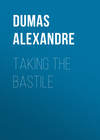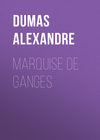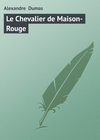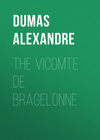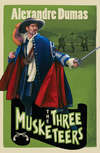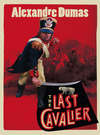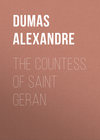Read the book: «Taking the Bastile»
CHAPTER I.
THE SON OF GILBERT
It was a winter night, and the ground around Paris was covered with snow, although the flakes had ceased to fall since some hours.
Spite of the cold and the darkness, a young man, wrapped in a mantle so voluminous as to hide a babe in his arms, strode over the white fields out of the town of Villers Cotterets, in the woods, eighteen leagues from the capital, which he had reached by the stage-coach, towards a hamlet called Haramont. His assured step seemed to indicate that he had previously gone this road.
Soon above him streaked the leafless boughs upon the grey sky. The sharp air, the odor of the oaks, the icicles and beads on the tips of branches, all appealed to the poetry in the wanderer.
Through the clumps he looked for the village spire and the blue smoke of the chimneys, filtering from the cottages through the natural trellis of the limbs.
It was dawn when he crossed a brook, bordered with yellow cress and frozen vines, and at the first hovel asked for the laborer's boy to take him to Madeline Pitou's home.
Mute and attentive, not so dull as most of their kind, the children sprang up and staring at the stranger, led him by the hand to a rather large and good-looking cottage, on the bank of the rivulet running by most of the dwellings.
A plank served as a bridge.
"There," said one of the guides nodding his head towards it.
Gilbert gave them a coin, which made their eyes open still more widely, and crossed the board to the door which he pushed open, while the children, taking one another's hand, started with all their might at the handsome gentleman in a brown cloth coat, buckled shoes and large cloak, who wanted to find Madeline Pitou.
Apart from them, Gilbert, for such was the young man's name, simply so for he had no other, saw no living things: Haramont was the deserted village he was seeking.
As soon as the door was open, his sight was struck by a scene full of charm, for almost anybody, and particularly for a young philosopher like our roamer.
A robust peasant woman was suckling a baby, while another child, a sturdy boy of four or five, was saying a prayer in a loud voice.
In the chimney corner, near a window or rather a hole in the wall in which was stuck a pane of glass, another woman, going on for thirty-five or six, was spinning, with a stool under her feet, and a fat poodle on an end of this stool.
Catching sight of the visitor the dog barked in a civil and hospitable manner just to show that he had not been caught napping. The praying boy turned, cutting the devotional phrase in two, and both females uttered an exclamation between joy and surprise.
"I greet you, good mother Madeline," said Gilbert with a smile.
"The gentleman has my name," she cried out with a start.
"As you notice; but please do not interrupt me. Instead of one babe at the breast, you are to have the pair."
In the rude country-made crib he laid his burden, a little boy.
What a pretty darling!" ejaculated the spinner.
"Quite a dear, yes, Aunt Angelique," said Madeline.
"Your sister?" inquired the visitor, pointing to the spinner who was also a spinster.
"No my man's sister."
"Yes, my auntie, my aunt 'Gelique," mumbled the boy, striking into the talk without being asked.
"Be quiet, Ange," rebuked his mother: "you are interrupting the gentleman."
"My business is very plain, good woman. The child you see is son of one of my master's farmers, the farmer being ruined. My master, his godfather, wants him brought up in the country to become a good workman, hale, and with good manners. Will you undertake this rearing?"
"But, master? – "
"Born yesterday and never nursed," went on Gilbert. Besides, this is the nursling which Master Niquet, the lawyer at Villers Cotterets, spoke to you about."
Madeline instantly seized the babe and supplied it with the nourishment it craved with a generous impetuosity deeply affecting the young man.
"I have not been misled," said he: "you are a good woman. In my master's name, I confide the child to you. I see that he will fare well here, and I trust he will bring into this cabin a dream of happiness together with his own. How much does Master Niquet pay you for his children?"
"Twelve livres a-month, sir: but he is rich, and he adds a few pieces for sugar and toys."
"Mother Madeline," replied Gilbert proudly, "this child will bring you twenty livres a-month, or two hundred and forty a-year."
"Lord bless us! I thank you kindly, master," said the peasant.
"And here is the first year's money down on the nail," went on Gilbert, placing ten fine gold coins on the table, which made the two women open their eyes and little Ange Pitou stretch out his devastating hand.
"But if the little thing should not live?" queried the nurse timidly.
"It would be a great blow – such a misfortune as seldom happens," responded the gentleman; "Here is the hire settled – are you satisfied?"
"Oh, yes, sir."
"Let us now pass to the future payments."
"Then we are to keep the child?"
"Probably, and be parents to it," said Gilbert, in a stifled voice and losing color.
"Dear, dear, is he an outcast?"
Gilbert had not expected such feeling and questions: but he recovered from the emotion.
"I did not tell you the whole truth," he said; "the poor father died on the shock of hearing that his wife gave up her life in bearing him the child."
The women wrung their hands with sympathy.
"So that the child can reckon on no love from his parents," continued Gilbert, breathing painfully.
At this point in tramped Daddy Pitou with a calm and jolly manner. His was one of those round and honest characters, overflowing with health and good will, such as Greuze paints in his natural domestic pictures. A few words showed him how matters stood. Out of good nature he understood things – even those beyond his comprehension.
Gilbert made it clear that the keep-money would be paid until the boy was a man and able to live alone with his mind and arm.
"All right," said Pitou, "I rather think we shall take to the kid, though he is a tiny creature."
"Look at that," said the women together, "he thinks it a little dear just like us."
"I should like you to come over to Master Niquet's where I will leave the money required so that you may be content and the child happy."
Gilbert took leave of the women and bent over the cradle in which the new-comer had ousted the rightful heir. He wore a sombre air.
"You look little like me," he muttered, "for you have the aspect of your proud mother, the aristocratic Andrea, daughter of Baron Taverney."
The trait broke his heart: he pressed his nails into his flesh to keep down the tears flowing from his aching breast. He left a kiss timid and tremulous on the babe's fresh cheek and tottered out. He gave half a louis to little Ange, who was stumbling between his legs, and shook hands with the women who thought it an honor. So many emotions oppressed the father of eighteen years that little more would have prostrated him. Pale and nervous, his brain was spinning.
"Let us be off," he said to Pitou, waiting on the sill.
"Master!" called out Madeline from the threshold: "his name – what did you say his name is?"
"Call him Gilbert," replied the young man with manly pride.
The business at the notary's was quickly done. Money was banked for the child's keep and bringing up as became a farmhand's offspring. For fifteen years education and training was to be given him, and the balance was to be devoted to fitting him in a trade or buying a plot of land. At his eighteenth year some two thousand livres were to be paid the nurse and her husband, who would have the other sum yearly from the intermediary.
As a reward Niquet was to have the interest of the funds.
Ten years passed and the Pitou woman, who had lost her husband while Ange was hardly able to remember him, felt herself dying. Three years before she had seen Gilbert, returned a man of twenty-seven, stiff, dogmatic of speech, cold at the outset. But his mask of ice thawed when he saw his son again, hearty, smiling and strong, brought up as he had planned. He shook the good widow's hand and said:
"Rely on me if ever in need."
He took the child away, went to see the tomb of Rousseau the philosopher, musician and poet, and returned to Villers Cotterets. Seduced by the good air and the praise of the Abbe Fortier's school for youth, he left Gilbert at that institution. He had thought highly of the tutor's philosophical mien; for philosophy was a great power at this revolutionary period and had glided into the bosom of the Church. He left him his address and departed for Paris.
Ange Pitou's mother knew these particulars.
At her dying hour she remembered the pledge of Gilbert to be the friend at need. It was a bright light. No doubt Providence had brought him to Haramont to provide poor Pitou with more than he lost in losing life and family.
Not able to write, she sent for the parish priest, who wrote a letter for her, and this was given to Abbe Fortier to be sent off by the post.
It was time, for she died next day.
CHAPTER II.
ANGE PITOU
Ange was too young to feel the whole extent of his loss: but he divined that the angel of the hearth had vanished: and when the body was taken to the churchyard and interred, he sat down by the grave and replied to all pleadings for him to come away by saying that Mamma Madeline was there, that he never had left her and he would stay beside her now.
It was there that Dr. Gilbert, for Ange Pitou's future guardian was a physician, found him when he hastened to Haramont on receiving the dying mother's appeal.
Ange was very young when thus he saw the doctor for the first time. But, we know, youth can feel deep impressions, leaving everlasting memories. The previous passing of the young man of mystery through the cottage had impressed its trace. He had left welfare with the boy: every time Ange heard his mother pronounce the benefactor's name, it had been almost with worship. Finally, when he appeared, grown up, adorned with the title of Physician, joining to the past boons the future promises, Pitou had judged by his mother's gratitude that he ought himself be grateful. The poor lad, without clearly knowing what he was saying, faltered words of eternal remembrance, and profound thanks such as he had heard his mother use.
Therefore, as soon as he perceived the doctor coming among the grassy graves and broken crosses, he understood that he came at his mother's appeal and he could not say no to him as to the others. He made him no resistance except to turn his head to look backwards as Dr. Gilbert grasped his hand and led him from the cemetery.
A stylish cab was at the gates, into which the doctor made the poor boy step, and he was taken to the town tailor's, where he was fitted with clothes: they were made too large so that he would grow up to them. At the rate our hero grew this would not take long.
Thus equipped, Ange was walked in a quarter of the town called Pleux, where Pitou's pace slacked. He recalled this as being the abode of his Aunt Angelique, of whom he had preserved an appalling memory.
Indeed the old maid had no attractions for a boy who cherished true motherly affections: she was nearly sixty by this period. The minute practice of religion had brutalized her, and mistaken piety had twisted all sweet, merciful and humane feelings, so that she cultivated in their stead a natural dose of greedy intelligence, augmented daily by her association with all the prudes. She did not precisely live on public charity but besides the sale of linen thread hand-spun, and letting out chairs in the church, she received from kindly souls ensnared by her devout posturings, petty coin which she converted into silver and that into gold. Nobody suspected she accumulated them and she stuffed the gold in the cushion and frame of an old armchair in which she sat at work.
It was to this venerable relative's dwelling that Gilbert led little Pitou. We might say Big Pitou, for he was too large for his age.
Miss Rose Angelique Pitou, as they came up, was in a merry humor as she had just sent another gold piece to go and keep company with the rest of her hoard. She was going around her seat of revenue when the doctor and his ward appeared at the door, and she had to welcome the relic of her family.
The interview would have been affecting if it had not been so grotesque. The doctor, a man of keen observation, and physiognomist, read the character of the hypocritical old maid at a glance. With her long nose, thin lips and small bright eyes, she collected in one person cupidity, selfishness and hypocrisy.
As soon as the stranger stated his little text on the duty of aunts to take care of their nieces and nephews, she turned sour and replied that, whatever her love for her poor sister, and her interest in her dear little nephew, the slenderness of her means did not permit her, though she was godmother as well as aunt, to add to her expenses.
"It is this way, Master Gilbert; this would run me into six cents a day extra, for that lubberly boy would eat a pound of bread."
Ange screwed up his face, for he could tuck away a pound and a half at breakfast alone.
"This is saying nothing for his washing, for he is a dirty little chap."
Considering that Ange was a regular gipsy for burrowing after moles and climbing trees, this was true enough; but it is fair to say that he tore his clothes worse than he soiled them.
"Fie!" said Doctor Gilbert; "do you who understand the Christian virtues so well, make such close calculations about a nephew and an orphan?"
"Then the keeping of his clothes in repair," went on the miser, recalling the quantity of patches she had seen sewn by her sister on the knees, and seat of Master Ange's pants.
"In short," said the doctor, "you refuse to shelter your nephew in your house – the orphan boy who will have to beg for alms at the doors of others."
Mean as she was, she felt the disgrace befalling her as if she drove her next of kin to this step.
"No, I will take charge of him," she said.
"Good," said the doctor, delighted to find a moist spot in this desert.
"I will recommend him to the Augustin Monastery and have them take him as a boy of all work."
The doctor was a philosopher, we have mentioned; which means that he was the opponent of all the churchmen. He resolved to tear this recruit from the enemy with all the warmth that the Augustines would have shown to deprive him of a disciple.
"Well," he rejoined, sticking his hand in his deepest pocket, "since you are in so hard a position, dear Miss Angelique, that you are forced to send your nephew into beggary, I will find somebody else to take him and the sum I am going to set aside for his maintenance. I am obliged to return to America. Meanwhile I must apprentice the boy to some craft, which he can choose for himself. In my absence he will grow up and then we will see what to make of him. Kiss your good aunt good-bye, and let us try our luck elsewhere," concluded the doctor.
He had barely finished before Pitou rushed into his aunt's long, bony arms to exchange the hug which he wanted to be in token of eternal separation. But the mention of a sum of money and Gilbert's movements of putting his hand in his pocket for cash, with the chink of silver, set the warmth of greed up from her old heart.
"Lord, doctor, do not you know that nobody in all the wide world can love this poor lone, lorn thing like his own dear fond auntie?"
Entwining him with her long arms, she imprinted on his cheeks a couple of kisses so sour that they made his hair stand on end and then curl with a shriveling up.
"Just what I thought; but still you are too poor to do the proper thing."
"Nay, good Master Gilbert," said the pious dame, "forget not that we have the Father of the fatherless above and that He has promised that a swallow shall not be sold for a penny without its being spent for the orphan's share."
"The text may be so, but it nowhere says that the orphan is to be bound out as a servant. I am afraid to do with Ange as I suggested; it would be too dear for your slight resources."
"But with the sum you spoke of, in your pocket," said the old devotee, with her eyes rivetted on the place whence the chink had sounded.
"I would give it, assuredly, but only on condition that the boy should be brought up to some livelihood."
"I promise that," cried Aunt Angelique; "I vow it, as true as the sheep are tempered for the storm-wind." And she raised her skeleton hand to heaven.
"Well," replied Gilbert, drawing out a bag rounded with coin; "I am ready to deposit the funds, but you must sign a contract at Lawyer Niquet's."
Niquet was her own business man and she raised no objections.
A bargain was made for five years: Ange Pitou was to be brought up to some trade and boarded, etc., for two hundred livres to his aunt, a-year. The doctor paid down the money.
Next day he quitted Villers, after arranging matters with a farmer on some property of his, named Billet, whose acquaintance we shall make in good time.
Miss Pitou, pouncing on the first payment in advance of the maintenance fund, buried eight bright gold pieces in her armchair bottom.
With eight livres over, she put the small change waiting to make up the amount of a gold piece to be placed, when converted, in the peculiar savings-bank.
We noticed the scant sympathy Ange felt for his aunt; he had foreseen the sorrow, disappointment and tribulations awaiting him under her roof.
In the first place, as soon as the doctor had turned his back, there was no longer a question about his learning any trade. When the good notary made a remark on this agreement, the tender aunt rejoined that her nephew was too delicate to be put out to work. The lawyer had admired his client's sensitive heart and deferred the apprenticeship question for another year. He was only twelve so that it would not waste much valuable time.
While his aunt was ruminating how to evade the contract, Ange resumed his truant life in the woods, as led at Haramont: it was the same woods and hence the same life.
As soon as he had the best spots located for bird-catching, he made some birdlime and having a four-pound loaf under his arm, he went off into the forest for the whole day.
He had foreseen a storm when he came back at nightfall, but he expected to parry it with the proceeds of his skill.
He had not presaged how the tempest would fall. In fact, Aunt Angelique had ambushed herself behind the door to deal him a cuff, as he crept in which he recognized as inflicted by her hard hand. Happily he had a hard head, too, and though the blow staggered him, he had the sense left to hold out as a peace-offering and buckler the talisman he had prepared. It was a bunch of two dozen small birds.
"What is this?" challenged his aunt, continuing to grumble for form's sake but opening her eyes more widely than her mouth.
"Birds, you see, good Aunt Angelique," replied Pitou as she grabbed the lot.
"Good to eat?" questioned the old maid who was greedy in all her senses of the word.
"Redbreasts and larks – I should bet they are good to eat – but they are better to sell. They command a good price in the market."
Where did you steal them, you little rogue?"
"Steal? they ain't stolen – I took 'em at the pool in the woods. A fellow has only to set up limed twigs anywhere round the water and the silly birds get tangled; then you run up, wring their necks, and there you have them."
"Lime? do you catch birds with lime?" queried Angelique.
"Not mortar lime, bless your innocence, but birdlime; it is made by boiling down holly sap."
"I understand, but where did you get the money to buy holly sap?"
"I should be a saphead to buy that: one makes it."
"Ah, then these birds are to be had for the picking up?"
"Yes: any day; but not everyday, for, of course, you cannot catch on Tuesday those you caught on Monday."
"Very true," returned the aunt, amazed at the brightness her nephew was for once displaying: "you are right."
This unheard of approval delighted the boy.
"But, on the days when you ought not to go to the pools, you go elsewhere. When you are not catching birds, you snare hares. You can eat them, too, and sell the skins for two cents."
Angelique stared at her nephew who was coming out as a financier.
"Oh, I can do the selling!"
"Of course, just as Mother Madeline did," for Pitou had never supposed he was to enjoy the fruit of his hunting.
"When will you go snaring hares?" she asked eagerly.
"I will go snaring hares and rabbits when I have wire for snares."
"All right, make it."
"Oh, I cannot do that," Pitou said, scratching his head. "I must buy that at the store but I can weave the springes."
"What does it cost?"
"I can make a couple of dozen with four cents' worth, and it ought to catch half a dozen bunnies – and the snares are used over and over again – unless the gamekeepers seize them."
"Here are four cents," said Aunt Angelique, "go and buy wire and get the rabbits to-morrow."
Wire was cheaper in the town than at the village so that Ange got material for twenty-four snares for three cents; he brought the odd copper to his aunt who was touched by this honesty. For an instant she felt like giving him the cent but unfortunately for Ange, it had been flattened by a hammer and might be passed in the dusk for a twosous piece. She thought it wicked to squander a piece that might bring a hundred per cent, and she popped it into her pouch.
Pitou made the snares and in the morning asked mysteriously for a bag. In it she put the bread and cheese for his meals, and away he went to his hunting ground.
Meanwhile she plucked the robins intended for their dinner; she took a brace of larks to Abbe Fortier, and two brace to the Golden Ball innkeeper, who paid her three cents for them and ordered as many as she could supply at that rate.
She went home beaming: the blessing of heaven had entered the house with Ange Pitou.
"They are quite right who say a good action is never thrown away," she observed as she munched the robins, as fat as ortolans and delicate as beccaficoes.
At dark in walked Ange, with the rounded out bag on his shoulders; Aunt Angelique received him on the threshold but not with a slap.
"Here I am, with my bag," said he with the calmness of having well spent his day.
"And what have you in the bag?" cried the aunt, stretching out her hand in sharp curiosity.
"Beech-mast," replied Pitou. "It is this way. If Daddy Lajeunesse, the gamekeeper, saw me rambling without the bag he would want to know what I was lurking for and he would feel suspicion. But when he challenged me with the bag, I just answered him: 'I am gathering beechmast, father – it is not forbidden to gather mast, is it?' and not being forbidden, he could not do anything. So he said nothing except: 'You have a good aunt, Pitou; give her my compliments.'"
"So you have been collecting mast instead of catching rabbits," cried Aunt Angelique, angrily.
"No, no, I laid my snares under cover of mast-gathering: the old donkey saw me doing that and thought it right."
"But the game?" said the woman, bent on the first principle.
"The moon will be up at twelve and I will go and see how many I have snared."
"You will go into the woods at midnight?"
"Why, not? what is there to be afraid of?"
The woman was as amazed at Ange's courage as at the breadth of his speculations. But brought up in the woods, Ange was not to be scared at what terrifies the town boy.
So at midnight he set out, skirting the cemetery wall, for the innocent lad, never in his ideas offending anybody, had no more fear of the dead than of the living.
The only person he dreaded was Lajeunesse. So he made a turn round his house and stopped to imitate the barking of a dog so naturally that the gamekeeper's basset "Snorer," deceived by the provocation, replied with a full throat and came to the door to sniff the air.
Pitou ran on, chuckling, for if Snorer were home his master was surely asleep there, as the man and the dog were inseparable.
In the snares two rabbits had been strangled, Pitou stuffed them into the pockets of a coat made too long for him and now too small.
Greed kept the aunt awake, though she had lain down. She had reckoned on two brace of game.
"Only a pair," said Pitou. "It is not my fault that I have not done better but these are the cunningest rabbits for miles round."
Next day Pitou renewed his enterprises and had the luck to catch three rabbits. Two went to the tavern and one to Abbe Fortier, who recommended Aunt Angelique to the benevolent of the town.
Thus things went on for three or four months, the woman enchanted and Ange thinking life endurable. Except for his mother's loss, matters were such as at Haramont: he passed his time in rural pleasures.
But an unexpected circumstance broke the jar of illusion of the prude and stopped the nephew's trapping.
A letter from Dr. Gilbert arrived from New York. He had not forgotten his little ward on landing, but asked Master Niquet if his instructions had been followed and if young Pitou were learning the means to make his own living.
It was a pinch, for there was no denying that Ange was in first-rate health. He was tall and lank but so are hickory saplings, and nobody doubts their strength and elasticity.
The aunt asked a week to put in her reply; it was miserable for both. Pitou asked no better career than he was leading, but it was quiet at the time; not only did the cold weather drive the birds away but the snow fell and as it would retain footprints, he dared not go into the woods to lay traps and snares.
During the week the old maid's claws grew; she made the stripling so wretched that he was ready to take up any trade rather than be her butt any longer.
Suddenly a sublime idea sprouted in her cruelly tormented brain, where peace reigned again.
Father Fortier had two purses for poor students attached to his school, out of the bounty of the Duke of Orleans.
Angelique resolved to beg him to enter Ange for one of them. This would cost the teacher nothing, and to say nothing of the game on which the woman had been nourishing the doctor for half a year, he owed something to the church-seat letter.
Indeed, Ange was received without fee by the schoolmaster.
The old girl was delighted for it was the school of the district where Dr. Gilbert's son was educated. He paid fifty livres and Ange got in for nothing, but nobody was to let Sebastian Gilbert or any others know that.
Whether they guessed this or not, Ange was received by his school fellows with that sweet spirit of brotherhood born among children and perpetuated among "the grown ups," in other words with hooting and teasing. But when three or four of the budding tyrants made the acquaintance of Pitou's enormous fist and were trodden under his even more enormous foot, respect began to be diffused. He would have had a life a shade less worried than when under Angelique's wing; but Father Fortier in soliciting little children to come unto him, forgot to warn them that the hands he held out were armed with the Latin Rudiments and birch rods.
Little did the aunt care whether the information was flogged or insinuated mentally into her nephew. She basked in the golden ray from dreamland that in three years Ange would pass the examination and be sent to college with the Orleans Purse.
Then would he become a priest, when he would, of course, make his aunt his housekeeper.
One day a rough awakening came to this delusion. Ange crawled into the house as if shod in lead.
"What is the matter?" cried Aunt 'Gelique, who had never seen a more piteous mien. "Are you hungry?"
"No," replied Pitou dolefully.
The hearer was uneasy, for illness is a cause of alarm to good mothers and bad godmothers, as it forces expenses.
"It is a great misfortune," Pitou blubbered: "Father Fortier sends me home from school – so no more studies, no examination, no purse, no college – "
His sobs changed into howls while the woman stared at him to try to read in his soul the reason for this expulsion.
"I suppose you have been playing truant again," she said. "I hear that you are always roaming round Farmer Billet's place to catch a sight of his daughter Catherine. Fie, fie! very pretty conduct in a future priest!"
Ange shook his head.
"You lie," shrieked the old maid, with her anger rising with the growing certainty that it was a serious scrape. "Last Sunday you were again seen rambling in Lovers-Walk with Kate Billet."
It was she who fibbed but she was one who believed the end justified the means, and a whale-truth might be caught by throwing out a tub-lie.
"Oh, no, they could not have seen me there," cried Ange; "for we were out by the Orange-gardens."
"There, you wretch, you see you were with her."
"But this is not a matter that Miss Billet is concerned in," ventured Ange, blushing like the overgrown boy of sixteen that he was.
"Yes, call her 'Miss' to pretend you have any respect for her, the flirt, the jilt, the mincing minx! I will tell her father confessor how she is carrying on."
"But I take my Bible oath that she is not a flirt."
"You defend her, when you need all the excuses you can rake up for yourself. This is going on fine. What is the world coming to, when children of sixteen are walking arm in arm under the shade trees."
"But, aunt, you are away out – Catherine will not let me 'arm' her – she keeps me off at arms-length."
"You see how you break down your own denials. You are calling her Catherine, plain, now. Oh, why not Kate, or Kitty, or some such silly nickname which you use in your iniquitous familiarity? She drives you away to have you come nearer, they all do."
"Do they? there, I never thought of that," exclaimed the swain, suddenly enlightened.
"Ah, you will have something else to think of! And she," said the old prude, "I will manage all this. I will ask Father Fortier to lock you up on bread and water for a fortnight and have her put in a nunnery if she cannot moderate her fancy for you."
